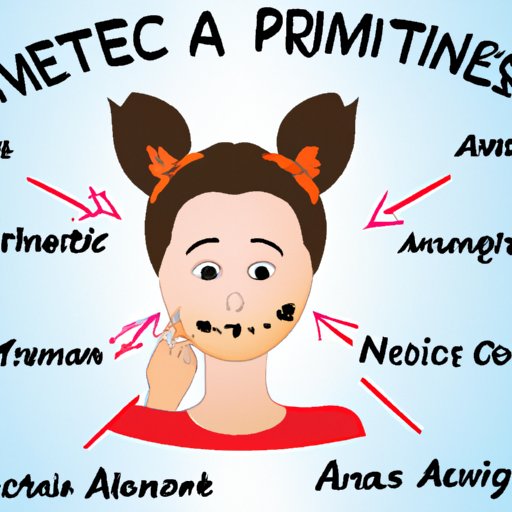Introduction
Acne is an inflammatory skin condition that affects millions of people worldwide. It is characterized by the appearance of pimples, blackheads, whiteheads, cysts, and other lesions on the face, neck, chest, back, shoulders, and upper arms. Acne is often associated with puberty, but it can affect people of all ages. While there is no single cause of acne, understanding the underlying causes and triggers can help you take steps to prevent and treat breakouts.

Exploring the Science of Acne: Causes and Solutions
Acne can be caused by a variety of factors, including hormones, stress, genetics, bacteria, and environmental factors. Here is a closer look at some of the most common causes of acne and potential solutions.
Hormonal Imbalances
Hormones play a major role in determining whether or not someone develops acne. During puberty, increased androgen hormones stimulate the sebaceous glands to produce more oil, which can clog pores and lead to breakouts. Hormonal imbalances can also occur during pregnancy, menopause, and certain medical conditions. To address hormonal imbalances, your doctor may recommend medications such as birth control pills or anti-androgens.
Stress and Anxiety
Stress and anxiety can trigger a cascade of hormones that can lead to inflammation and acne breakouts. Additionally, when we’re stressed out, we often make poor dietary choices, which can further aggravate the skin. To reduce stress and anxiety, try incorporating relaxation techniques such as yoga, deep breathing, and meditation into your daily routine.
Genetics and Heredity
If one or both of your parents had acne, you may be more likely to develop it yourself. Research has shown that certain genes are linked to an increased risk of developing acne. Unfortunately, there is no way to prevent this genetic predisposition, but taking proactive steps to keep your skin clean and healthy can help reduce the severity of breakouts.
Bacteria and Clogged Pores
Excess oil production, dead skin cells, and bacteria can all contribute to clogged pores and acne breakouts. To reduce breakouts, it is important to keep your skin clean and free of excess oil. Look for cleansers that contain salicylic acid, benzoyl peroxide, or tea tree oil, as these ingredients can help unclog pores and reduce bacteria.
Environmental Factors
Hot, humid climates can lead to excessive sweating, which can clog pores and trigger breakouts. Pollution, dust, and smoke can also irritate the skin and lead to breakouts. To reduce the risk of breakouts, it is important to keep your skin clean and protect it with sunscreen when outdoors.
What Is Causing My Adult Acne?
In adults, acne is often caused by hormonal changes due to stress, poor diet, and certain medications. Hormonal fluctuations can cause an increase in oil production, leading to clogged pores and breakouts. Stress and poor dietary choices can also lead to hormone imbalances and acne breakouts. Certain medications, such as corticosteroids, some antidepressants, and lithium, can also cause acne breakouts.

The Link Between Diet and Acne
There is evidence to suggest that certain foods can trigger breakouts, while others can help fight acne. Foods that are high in sugar, dairy products, processed foods, and vegetable oils are known to increase inflammation and worsen acne. On the other hand, foods that are high in antioxidants, omega-3 fatty acids, and vitamins A, C, and E can help reduce inflammation and clear up acne.

5 Simple Steps to Prevent Acne Breakouts
Taking simple steps to keep your skin clean and healthy can help reduce the risk of breakouts. Here are five easy tips for preventing acne:
Practice Good Hygiene
Wash your face twice a day with a gentle cleanser, and avoid scrubbing too hard or using harsh soaps. After washing your face, use a light moisturizer to help lock in moisture.
Avoid Touching Your Face
Touching your face with dirty hands can spread bacteria and cause breakouts. To reduce the risk of breakouts, try to avoid touching your face as much as possible.
Keep Hair Clean
Dirty hair can transfer oil and bacteria to your face, leading to breakouts. To reduce the risk of breakouts, wash your hair regularly and keep it pulled away from your face.
Wear Sunscreen
Sun exposure can damage your skin and trigger breakouts. To protect your skin, wear a broad-spectrum sunscreen with an SPF of 30 or higher every day.
Drink Plenty of Water
Staying hydrated helps flush toxins from your body and keep your skin healthy. Aim to drink eight glasses of water a day to keep your skin looking and feeling its best.
Natural Remedies for Treating Acne
In addition to conventional treatments, there are several natural remedies that can help treat acne. Tea tree oil, apple cider vinegar, coconut oil, honey, and aloe vera are all natural ingredients that can help reduce inflammation and clear up breakouts. Before using any natural remedy, it is important to do a patch test to ensure it won’t irritate your skin.
Conclusion
Acne is a common skin condition that can be caused by a variety of factors, including hormones, stress, genetics, bacteria, and environmental factors. Understanding the underlying causes of your acne can help you take steps to prevent and treat breakouts. Practicing good hygiene, avoiding touching your face, keeping your hair clean, wearing sunscreen, and drinking plenty of water can help reduce the risk of breakouts. Additionally, there are several natural remedies that can help treat acne, including tea tree oil, apple cider vinegar, coconut oil, honey, and aloe vera.
Final Thoughts
Acne is a common skin condition that can be caused by a variety of factors. While there is no surefire cure for acne, understanding the underlying causes and triggers can help you take steps to prevent and treat breakouts. Incorporating simple lifestyle changes, such as practicing good hygiene and eating a healthy diet, can help reduce the risk of breakouts, as well as natural remedies such as tea tree oil, apple cider vinegar, coconut oil, honey, and aloe vera.


